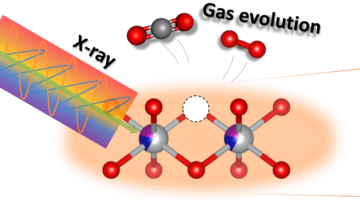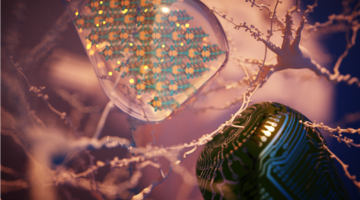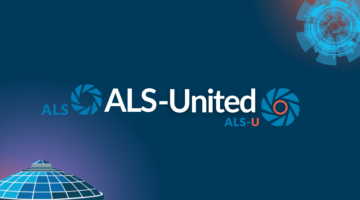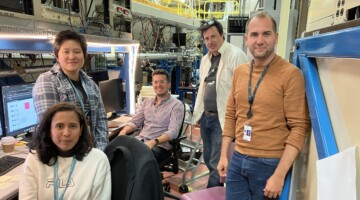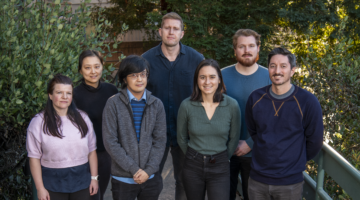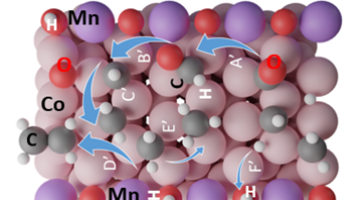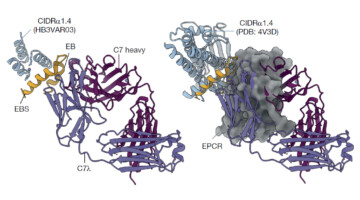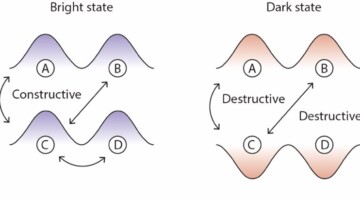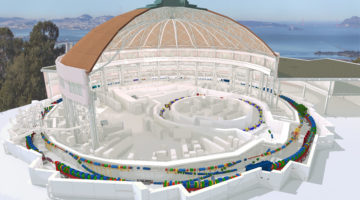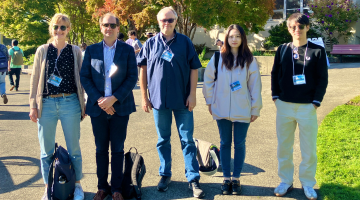Researchers used soft x-ray resonant inelastic x-ray scattering at the ALS to understand the role of aluminum doping in improving the stability of commercially used cathode materials for lithium-ion batteries. Read more »
Mind-Blowing Materials: Mimicking Neurons for Faster Computing
Researchers used x-ray absorption spectroscopy and resonant inelastic x-ray scattering at the ALS to uncover the atomic-level mechanism of conductance switching for a neuromorphic material that has the potential for energy-efficient computing. Read more »
2025 ALS-United New Year’s Message
Interim ALS Director, Andreas Scholl and Interim ALS-U Project Director Dimitri Argyriou usher in 2025 with a message for you on the ALS-U project and the priorities for the new year. Watch their conversation or access the full transcript. Read more »
Autonomous Beamlines: Harnessing Bayesian Optimization to Revolutionize Accelerator Science
Scientists at the Advanced Light Source are developing automated beam optimization systems, collaborating with other light sources to deploy common controls across facilities. Using machine learning, they demonstrated automated beamline alignment that optimizes beam size and flux at the push of a button. Read more »
New UEC Members for 2025
Welcome to new 2025 members Joshua Del Mundo, Wei He, Matt Landsman, Lowell Miyagi, and Brandy Toner. Special thanks to the outgoing members, Inna Vishik, Connor Bischak, Sharon Bone, Devin Grabner, Yu He, and Grant Shoffner for their service. Read more »
Understanding the Role of Manganese in Fuel Production Catalysts
Using specialized equipment at the Advanced Light Source (ALS), including a custom-built reaction cell, researchers uncovered the role of manganese in cobalt manganese oxide catalysts used for fuel production. Read more »![]()
![]()
Identification and Structural Characterization of Antibodies for Severe Malaria
Researchers used x-ray crystallography at the ALS to characterize how two newly discovered antibodies prevent the protein interactions responsible for severe malaria. Understanding this mechanism offers novel insights for vaccine development. Read more »![]()
![]()
Hide-and-Seek with Sneaky Electrons in Solids
Researchers used angle-resolved photoemission spectroscopy (ARPES) at the Advanced Light Source (ALS) to demonstrate the existence of dark—state electrons in solids for the first time, providing insights into complex phenomena in physics, such as high-temperature superconductivity and optoelectronics.
Read more »
ALS Statement on ALS-U Project Update
The ALS-U project recently made an extensive update to its project plan, resulting in a shift in the start of the one-year dark time from October 1, 2025, to June 22, 2026. The updated project schedule will allow the ALS to deliver more beamtime to users before the start of the dark time and further reduces the possibility that the ALS dark time will overlap with the APS’s ramp-up to full operations following their upgrade, currently in progress. Read more »
ALS at the Far West Section of the American Physical Society Meeting
The 2024 Fall Meeting of the APS Far West Section at Cal Poly Humboldt featured over 100 students presenting research. Inspiring attendees through their expertise and mentorship were ALS colleagues Antoine Islegen-Wojdyla, Hendrik Ohldag, Xiaoya Chong, and Wei “Francis” He. Read more »
